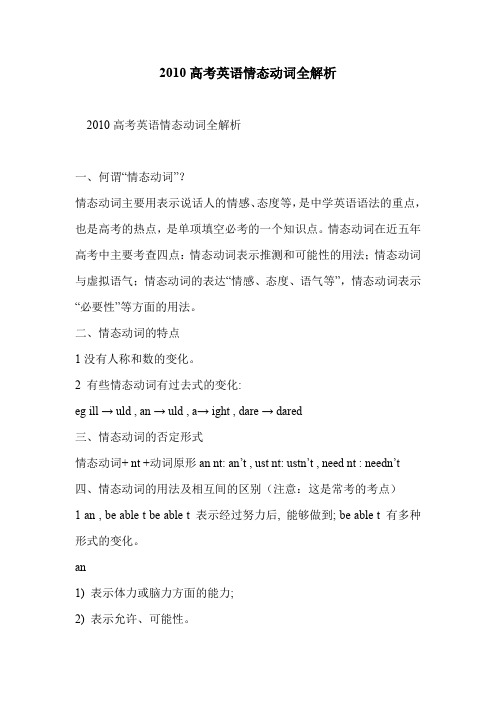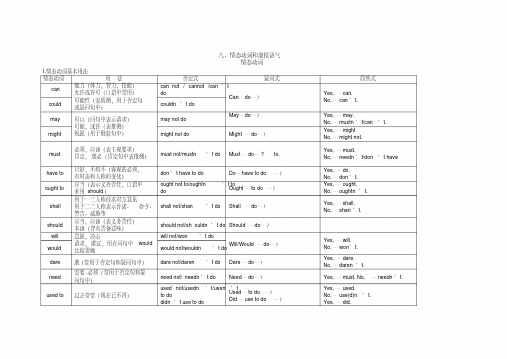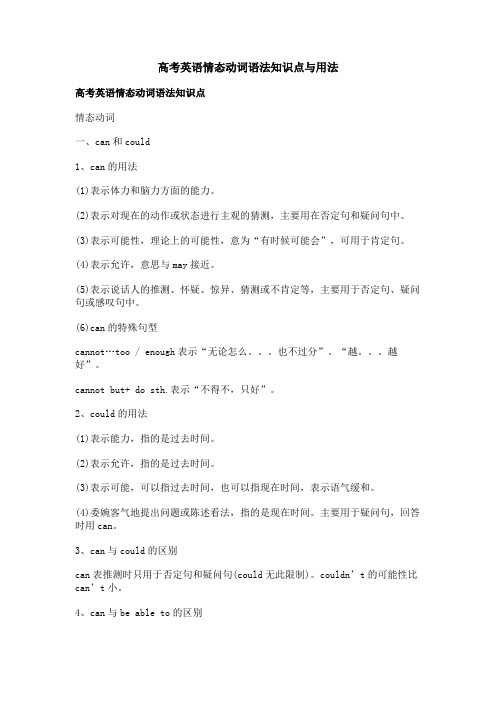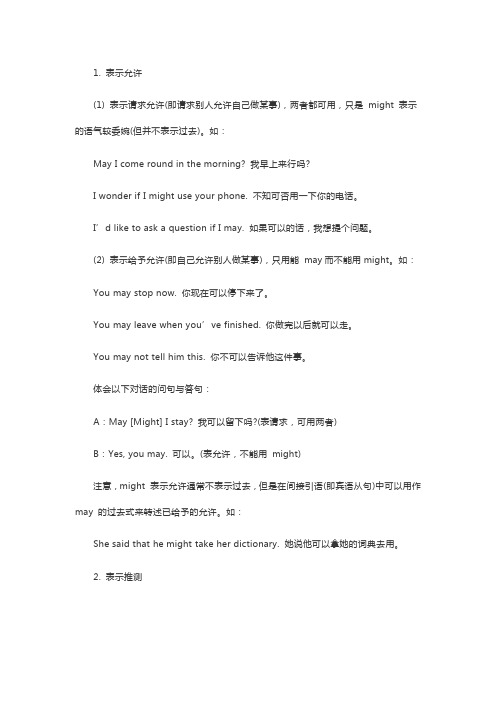高考英语情态动词知识点知识点(4)
情态动词知识点高职高考

情态动词知识点高职高考情态动词作为英语语法中的一种重要词类,具有一定的复杂性和灵活性。
在高职高考中,掌握情态动词的知识点是非常重要的。
本文将以情态动词的定义、用法、否定和疑问句的构造以及情态动词在写作中的运用等方面进行论述。
一、情态动词的定义情态动词是指用来表达说话人的态度、能力、推测等情态的动词。
常见的情态动词包括can、could、may、might、must、shall、should、will、would等。
二、情态动词的用法1. 表示能力:can与could用于表示能力或可能性,can表示一般的能力,could表示过去的能力或假设的能力。
例如:I can swim.(我会游泳。
)He could play the violin when he was three.(他三岁时就会拉小提琴。
)2. 表示推测:may与might用于表示推测,may表示可能性较大,might表示可能性较小。
另外,should用于表示推测时多表示应该发生的情况。
例如:She may be tired.(她可能累了。
)It might rain tomorrow.(明天可能会下雨。
)He should be studying right now.(他现在应该在读书。
)3. 表示义务或建议:must与should用于表示义务或建议,must表示强制性的义务或必然发生的情况,should表示适当或理所当然的建议。
例如:You must finish your homework before you go out to play.(你必须在外出玩之前完成作业。
)You should eat more fruits and vegetables for a healthy diet.(为了健康的饮食,你应该多吃水果和蔬菜。
)三、情态动词的否定形式情态动词的否定形式是在情态动词前加not。
此外,构成否定句时,主语与情态动词之间需要加入助动词do。
2010高考英语情态动词全解析

2010高考英语情态动词全解析2010高考英语情态动词全解析一、何谓“情态动词”?情态动词主要用表示说话人的情感、态度等,是中学英语语法的重点,也是高考的热点,是单项填空必考的一个知识点。
情态动词在近五年高考中主要考查四点:情态动词表示推测和可能性的用法;情态动词与虚拟语气;情态动词的表达“情感、态度、语气等”,情态动词表示“必要性”等方面的用法。
二、情态动词的特点1没有人称和数的变化。
2 有些情态动词有过去式的变化:eg ill → uld , an → uld ,a→ ight , dare → dared三、情态动词的否定形式情态动词+ nt +动词原形an nt: an’t , ust nt: ustn’t , need nt : needn’t四、情态动词的用法及相互间的区别(注意:这是常考的考点)1 an , be able t be able t 表示经过努力后, 能够做到; be able t 有多种形式的变化。
an1) 表示体力或脑力方面的能力;2) 表示允许、可能性。
uld 是an的过去式, 表示过去有能力及过去存在的可能性; 用于疑问句表示委婉地提出问题。
1) The fire spread thrugh the htel ver quil but everne ____ get utA had tB uld uld D as able t2) -ill u sta fr lunh?-Srr, __ brther is ing t see eA I ustn’tB I an’t I needn’t D I n’t2a 表示询问或说明一事可不可做; 表示某事有可能发生。
ight是a的过去式; 用在疑问中比a委婉、客气。
1) -a I tae this b ut f the reading-r?-N, u ustn’t ( es, u a)2) -ight I ae a suggestin? -es, u a3 ust1) 表示必须要做的事: 必须2) 表示很有把握的推断: 一定, 准是。
高三英语高考语法知识点归纳总结情态动词和虚拟语气情态动词

八、情态动词和虚拟语气情态动词I.情态动词基本用法情态动词用法否定式疑问式简答式can 能力(体力,智力,技能)允许或许可(口语中常用)可能性(表猜测,用于否定句或疑问句中)can not / cannot /can’tdoCan…do…?Yes,…can.No,…can’t.could couldn’t domay 可以(问句中表示请求)可能,或许(表推测)祝愿(用于倒装句中)may not doMay…do…?Yes,…may.No,…mustn’t/can’t.might might not do Might…do…?Yes,…might No,…might not.must 必须,应该(表主观要求)肯定,想必(肯定句中表推测)must not/mustn’t do Must…do…? to.Yes,…must.No,…needn’t/don’t havehave to 只好,不得不(客观的必须,有时态和人称的变化)don’t have to do Do…have to do…?Yes,…do.No,…don’t.ought to 应当(表示义务责任,口语中多用should)ought not to/oughtn’t todoOught…to do…?Yes,…ought.No,…oughtn’t.shall 用于一三人称征求对方意见用于二三人称表示许诺、命令、警告、威胁等shall not/shan’t do Shall…do…?Yes,…shall.No,…shan’t.should 应当,应该(表义务责任)本该(含有责备意味)should not/sh ouldn’t do Should…do…?will 意愿,决心请求,建议,用在问句中would比较委婉will not/won’t doWill/Would…do…?Yes,…will.No,…won’t.would would not/wouldn’t dodare 敢(常用于否定句和疑问句中)dare not/daren’t do Dare…do…?Yes,…dare. No,…daren’t.need 需要,必须(常用于否定句和疑问句中)need not/needn’t do Need…do…?Yes,…must. No,…needn’t.used to 过去常常(现在已不再)used not/usedn’t/usen’tto dodidn’t use to doUsed…to do…?Did…use to do…?Yes,…used.No,…use(d)n’t.Yes,…did.No,…didn’t. II.情态动词的重点知识表示“能力、许可”的can和may 表示能力的情态动词用can/couldA computer_____think for itself; it must be told what to do.A.can’tB.must n’tC.may notD.might not表示许可时用may/might ,can/could 都可以,但在问句中用could…?或might…?以使口气委婉客气,其回答一定要用can或may,以使回答口气明确(must表示一定,必须,mustn’t表示禁止,不许可)。
2023考生必背高考英语知识点归纳总结

2023考生必背高考英语知识点归纳总结高中英语必背知识点归纳1、情态动词与助动词1、can能,可以,表说话人同意,许可还可表客观条件许可,如:You can go now.提建议或请求时可用can I, can you表客气,如Can I buy you a drink?can和be able to表能力时的区别。
can表一般具有的能力,be able to表在特定条件下的能力,如:Although the driver was badly hurt,he wasable to explain what had happened.2、may(1)可以,表说话人同意,许可或请求对方许可。
You may go.(2)(现在和将来)可能,也许,只用于肯定句和否定句中,如He may not be right.3、must,have tomust表主观上的必须,have to表客观上的必须,如:It#39;s getting late. I have to go. -Must I go now.-Yes,you must.(No, you needn#39;t./ No, you don#39;t have to.)4、need,dare这二词有实意动词和情态动词两种词性,如用作实意动词后接动词不定式to do,如用作情态动词后接动词原形。
Need I go now? --Yes, you must./No, you needn#39;t.)5、shall用于第一人称疑问句中表说话人征求对方的意见或向对方请求,如,Shall we begin our lesson?用于二、三人称陈述句,表说话人命令、警告、允诺、威胁等口吻,如: You shall fail if you don#39;t workharder.6、should表应该,意为有责任,有义务。
如:We should try our best to make our country more beautiful.7、will表有做某事的意志、意愿、安心、打算,如Will you lend me your book? Yes, I will.8、should have done表应该做而未做must have done表对过去事实的肯定推测could have done表本可以做某事9、判断句:肯定句用must,否定句用can#39;t,不太肯定用may,mightHe must be in the office now.He must have gone to bed, for the light is out.He can#39;t be in the office. He is at home.He couldn#39;t have cleaned the classroom, because he didn#39;t come here today.He might be in the office, I am not sure.He might have cleaned the room, I suppose.2让步状语从句1、though,although,as的区别A、Though,although的主句中可以用yet, still, nevertheless,但不可使用but。
高考英语情态动词语法知识点与用法

高考英语情态动词语法知识点与用法高考英语情态动词语法知识点情态动词一、can和could1、can的用法(1)表示体力和脑力方面的能力。
(2)表示对现在的动作或状态进行主观的猜测,主要用在否定句和疑问句中。
(3)表示可能性,理论上的可能性,意为“有时候可能会”,可用于肯定句。
(4)表示允许,意思与may接近。
(5)表示说话人的推测、怀疑、惊异、猜测或不肯定等,主要用于否定句、疑问句或感叹句中。
(6)can的特殊句型cannot…too / enough表示“无论怎么。
也不过分”。
“越。
越好”。
cannot but+ do sth.表示“不得不,只好”。
2、could的用法(1)表示能力,指的是过去时间。
(2)表示允许,指的是过去时间。
(3)表示可能,可以指过去时间,也可以指现在时间,表示语气缓和。
(4)委婉客气地提出问题或陈述看法,指的是现在时间。
主要用于疑问句,回答时用can。
3、can与could的区别can表推测时只用于否定句和疑问句(could无此限制)。
couldn’t的可能性比can’t小。
4、can与be able to的区别(1)现在时:无区别,但后者不常用。
(2)完成时;can没有完成时,此时要用have(has,had)been able to。
(3)将来时:can没有将来时,要用will be able to。
(4)过去时:could表示一般能力,was/were able to 表示在具体场合通过努力成功做成某事的能力。
二、may 和might1、may的用法(1)表示询问或说明一件事可不可以做。
(2)表示一件事或许会发生或某种情况可能会存在,通常用在肯定句和否定句中。
注意:表示可能性时,can’t语气强,表示“不可能”,may not语气弱,表示“可能不”。
2、might的用法(1)表示询问或允许,指的是过去时间。
(2)表示可能发生的事,可以指过去时间,也可以指现在时间,语气更加不肯定,可能性比may小一些。
高考英语必备知识点:情态动词may与might用法归纳

1. 表示允许(1) 表示请求允许(即请求别人允许自己做某事),两者都可用,只是might 表示的语气较委婉(但并不表示过去)。
如:May I come round in the morning? 我早上来行吗?I wonder if I might use your phone. 不知可否用一下你的电话。
I’d like to ask a question if I may. 如果可以的话,我想提个问题。
(2) 表示给予允许(即自己允许别人做某事),只用能may而不能用might。
如:You may stop now. 你现在可以停下来了。
You may leave when you’ve finished. 你做完以后就可以走。
You may not tell him this. 你不可以告诉他这件事。
体会以下对话的问句与答句:A:May [Might] I stay? 我可以留下吗?(表请求,可用两者)B:Yes, you may. 可以。
(表允许,不能用might)注意,might 表示允许通常不表示过去,但是在间接引语(即宾语从句)中可以用作may 的过去式来转述已给予的允许。
如:She said that he might take her dictionary. 她说他可以拿她的词典去用。
2. 表示推测两者都可用,只是might 比may 语气更不确定,表示的可能性更小(注意此时的might并不表过去)。
在句型使用方面:may通常用于肯定句或否定陈述句,一般不用于疑问句(疑问句中用can, 参见can),而might 则可用于肯定句、否定句或疑问句。
在用法方面注意以下几点:(1) 后接动词原形,表示对现在或将来的推测。
如:He may [might] be in his office now. 他现在说不定在办公室里。
Might he know the answer? 他可能知道答案吗?(2) 后接动词进行式,表示动作正在进行或将要发生。
高考英语新情态动词知识点

高考英语新情态动词知识点在高考英语中,情态动词一直是一个重要的语法知识点。
近年来,对于新情态动词的考查也逐渐增多。
新情态动词包括 ought to、have to、be supposed to 等,它们在用法和语义上都有其独特之处。
首先,我们来看看 ought to。
ought to 表示“应该”,语气比 should 稍强。
它常用于表示责任、义务或正确的做法。
例如:“You ought to study harder if you want to get good grades”(如果你想取得好成绩,你应该更努力学习。
)需要注意的是,ought to 的否定形式是 ought not to,疑问形式是将 ought 提前。
接着是 have to。
have to 强调由于外部的客观原因而“不得不”做某事。
它有人称、数和时态的变化。
比如:“I have to go now because it's getting late”(我现在得走了,因为天色已晚。
)“She had to stay athome yesterday because she was ill”(她昨天不得不待在家里,因为她生病了。
)与 must 不同,must 通常表示主观上的“必须”,而 have to 更侧重于客观上的无奈。
再来说说 be supposed to。
这个短语有多种含义,常见的有“应该;被期望”。
“You are supposed to arrive on time”(你应该准时到达。
)它还可以表示“本应;本该”,用来表示某事没有按照预期发生。
例如:“The train was supposed to leave at 9 o'clock, but it's delayed”(火车本该 9 点出发,但晚点了。
)在具体的语境中,这些新情态动词的运用需要我们仔细分辨。
比如,在表达建议时,ought to 可能更合适;在强调客观条件限制时,have to 更为准确;而 be supposed to 则在描述期望和规定方面用得较多。
【高考英语必考知识点】情态动词重难点,你不可不知!

【高考英语必考知识点】情态动词重难点,你不可不知!情态动词有具体的词义,但也同助动词一样,需要与动词原形一起构成句子的谓语,另外情态动词没有人称和数的变化,情态动词后必须跟动词原形。
考点一:情态动词在陈述句中的用法1. can⑴表示能力,一般译为“能、会”,尤其指生来具备的能力。
She can swim fast, but I can’t .她会游泳,但我不会。
⑵表示许可,常在口语中。
You can use my dictionary.你可以使用我的词典。
⑶表示推测,意为“可能”,常用于否定句和疑问句中,此时can’t译为“不可能”。
Can the news be true?这个消息可能是真的吗?It can’t be our teacher. He is on a visit to the Great Wall.不可能是我们老师。
他正在参观长城呢。
2. could⑴can的过去式,意为“能、会”,表示过去的能力。
He could write poems when he was 10.他十岁的时候就会写诗。
⑵could在疑问句中,表示委婉请求的语气,此时could没有过去式的意思。
Could you do me a favour?你可以帮我一个忙吗?—Could I use your pen? 我可以使用你的钢笔吗?—Yes, you can.(注意回答)可以。
3. may⑴表示请求、许可,比can正式,May I borrow your bike?我可以借用你的自行车吗?You may go home now.你现在可以回家了。
⑵表示推测,谈论可能性,意为“可能,或许”,一般用于肯定句中。
It may rain tomorrow .明天可能会下雨。
⑶may的过去式为might。
might 也可以表示可能性低于may(此时might 没有过去式的意思)。
He is away from school. He might be sick.他离开学校了。
- 1、下载文档前请自行甄别文档内容的完整性,平台不提供额外的编辑、内容补充、找答案等附加服务。
- 2、"仅部分预览"的文档,不可在线预览部分如存在完整性等问题,可反馈申请退款(可完整预览的文档不适用该条件!)。
- 3、如文档侵犯您的权益,请联系客服反馈,我们会尽快为您处理(人工客服工作时间:9:00-18:30)。
高考英语情态动词知识点知识点(4)一、选择题1.Louis Cha (金庸) passed away. As for his achievement, there is such a comment, “He ______ the Nobel Prize for Literature with his written works translated into English.”A.could have been rewarded B.must have been rewardedC.should be rewarded D.need have been rewarded2.You ______ feel all the training a waste of time, but I'm a hundred percent sure later you'll be grateful you did it.A.may B.can C.should D.would3.They worked hard day and night during the next ten years ________ they ________ pay for the lost necklace.A.so…would B.so that…would C.in order that…could D.and…would 4.—Where is my dictionary?I remember I put it here yesterday.—You___it in the wrong place.A.must put B.should have putC.might put D.might have put5.-Jenny took the 8:00 bus to Guangzhou this morning.-Really? He__the 9:00 train. It's much more comfortable and safer to travel by train. A.could have taken B.should takeC.must have taken D.can take6.–Will you read me a story, Mummy?--OK. You ______have one if you go to bed as soon as possible.A.might B.must C.could D.shall7.You ___________ a better mark, but you didn’t work hard.A.could have had B.would have had C.must have had D.must have 8.—Life ____ be very hard for people living in the north of Canada as it is very cold there in winter.—Yes, the weather there _____ be as low as 60℃ below zero.A.must; can B.shall; must C.will; should D.has to; can 9.Although you ______ find bargains in London, it’s not generally a cheap place to shop. A.should B.need C.must D.can10.You don’t look well, you __________ see the doctor.A.ought to B.mayC.can D.might11.—I phoned you yesterday morning. A girl answered, but I didn’t recognize the voice.—Oh, it ________ my younger sister. She was in my room at that moment.A.must have been B.should have beenC.could have been D.may have been12.Tourists who enter the quiet area _____ obey the rule to reduce any potential effect on the environment.A.can B.may C.shall D.dare13.He didn’t follow the doctor’s suggestions as required, but he _________.A.ought B.ought to C.ought to be D.ought to have 14.He did not regret saying what he did but felt that he _________ it differently.A.could express B.would expressC.could have expressed D.must have expressed15.–Do you know where David is? He is not in the office.–Well, he ______ have gone far—his coat is still here.A.shouldn’t B.mustn’t C.can’t D.wouldn’t16.He ______ writing the paper now. He hadn’t written a single word when I left him ten minutes ago.A.shouldn’t be B.c an’t have finishedC.can’t be D.mustn’t have finished17.Helen________ go on the trip with us, but she isn’t quite sure yet.A.shall B.may C.must D.can18.------ Tom is never late for work. Why is he absent today?------ Something _________ to him.A.must happen B.should have happenedC.could have happened D.must have happened19.We lost our way in that small village, otherwise we ________more places of interest yesterday.A.visited B.had visitedC.would visit D.would have visited20.—Jane, why don’t you ta ke a bite of the chocolate?—Well, I am on diet, if you __________know.A.must B.shall C.would D.could21.Word that you _________ enjoy a three-day holiday has come if you do complete the task on time.A.may B.should C.could D.shall22.—Is there a holiday recently?—There_____ be. It has been informed that we will continue to study for another three weeks. A.won’t B.mustn’t C.may not D.can’t 23.—Sorry, Mum! I failed the job interview again.—Oh, it's too bad. You________ have made full preparations.A.must B.can C.would D.should24.Mr. White _______ to hospital for an examination yesterday but he was too busy to come. A.should come B.should have come C.should be coming D.should had come 25.—You look so tired. You________ late last night.—Yes. I had to to do an important report and stayed up till I completed it.A.should sleep B.must sleepC.should have slept D.must have slept【参考答案】***试卷处理标记,请不要删除一、选择题1.A解析:A【解析】【分析】【详解】考查情态动词+have done用法。
句意:金庸去世了,至于他的成就,有这样的评论:他本能获得诺贝尔文学奖用他的被翻译成了英语的著作。
A. could have been rewarded本可以被授予;B. must have been rewarded一定被授予;C. should be rewarded应该被授予;D. need have been rewarded本必要被授予。
根据语境,A选项正确。
【点睛】could have done可用于肯定句、疑问句和否定句。
用于肯定句既可以表示过去能够做而实际未做,有惋惜、遗憾或委婉批评之意,通常译为“本来可以”“本来能”,也可以表示对过去动作的推测,常可译为“可能(已经)”。
本句表达金庸本能获得诺贝尔文学奖,但却没有获得的惋惜。
故A选项正确。
2.A解析:A【解析】【分析】【详解】考查情态动词。
句意:你可能觉得所有的训练都是在浪费时间,但我百分之百地肯定,以后你会感谢你所做的一切。
A. may可能;或许;B. can可能;C. should应该;D. would 会;将会。
